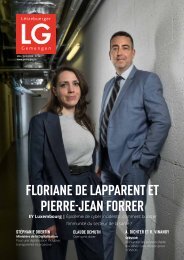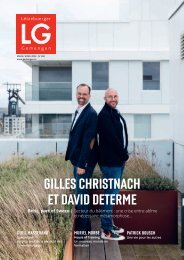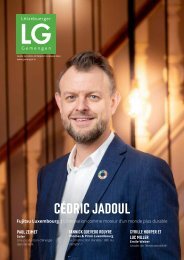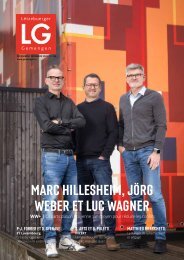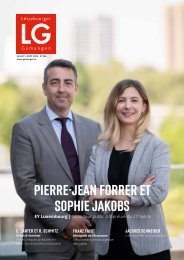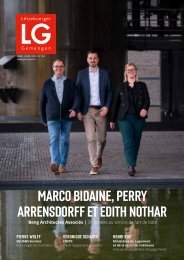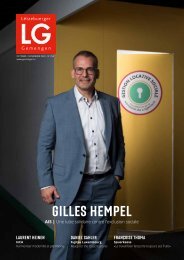LG_197
Create successful ePaper yourself
Turn your PDF publications into a flip-book with our unique Google optimized e-Paper software.
Brève<br />
économique<br />
ICT<br />
MIPIM<br />
Le Marché International des Professionnels<br />
de l’Immobilier entre révolution<br />
technologique et évolution sociétale<br />
Ronan Vaspart, directeur du MIPIM<br />
Inauguré en grande pompe, visité par des<br />
personnalités et des présidentiables, le<br />
Marché International des Professionnels de<br />
l’Immobilier a posé ses valises au Palais des<br />
Festivals à Cannes du 14 au 17 mars 2017.<br />
Etabli depuis 1990, ce haut lieu d’échanges<br />
entre les professionnels de l’immobilier de<br />
tout horizon s’est donné pour objectif de<br />
répondre aux défis de la révolution technologique,<br />
de l’instabilité géopolitique et de l’évolution<br />
sociétale.<br />
La thématique centrale de l’édition 2017 du<br />
MIPIM est «la Nouvelle Donne de<br />
l’Immobilier», une tentative d’apporter des<br />
réponses aux principaux challenges qui<br />
impacteront le secteur de l’immobilier dans<br />
les années à venir.<br />
Malgré des avancées significatives dans plusieurs<br />
domaines, d’aucuns pensent que le<br />
secteur attend encore des innovations de<br />
rupture, notamment sociales.<br />
Les uns améliorent la gestion locative ou<br />
s’adaptent aux nouvelles technologies, les<br />
autres facilitent les transactions, mais sans<br />
pour autant se donner les moyens de devenir<br />
le Facebook ou le Uber du secteur.<br />
L’immobilier s’adapte certes aux nouveaux<br />
usages mais n’en invente pas encore.<br />
Source: pressroom.mipim.com<br />
“<br />
it is about evolution and collaboration<br />
”<br />
The future of financial services is not about disruption;<br />
LFF: How will Brexit impact London’s<br />
FinTech hub? Will it speed up the arrival<br />
of Start-ups in Luxembourg?<br />
NZ: Brexit is a sad event for all in Europe.<br />
Luxembourg has always worked closely with<br />
London as a partner, and we hope this will<br />
not change in the future. However, a good<br />
business leader cannot risk the uncertainty of<br />
the known unknowns related to Brexit and is<br />
already looking at how to mitigate these<br />
risks, be they a large traditional financial institution<br />
or a startup. PPRO, a London based<br />
FinTech startup, announced that they will<br />
establish a European base in Luxembourg<br />
and they will certainly not be the last to<br />
consider Luxembourg as a channel for the<br />
European market now that London is unlikely<br />
to be the long-term solution. Likewise, startups<br />
from the US, Asia and Middle East, looking<br />
at European expansion for growth, are<br />
no longer considering London. One key factor<br />
in their decision-making will be language<br />
–firms from these locations are unlikely to<br />
speak French, German, Spanish or Dutch.<br />
They need English. Luxembourg’s trilingual<br />
capability in business and, very importantly,<br />
in dealing with the regulator including filing<br />
of license applications, is a huge advantage<br />
and draw. Couple this with Luxembourg’s<br />
friendly business environment, accessibility,<br />
talent pool, funding options such as The<br />
Luxembourg Future Fund, plethora of financial<br />
services firms and strong community<br />
engagement, and I am very certain we will<br />
see a growing number of startups moving to<br />
Luxembourg inthe coming years.<br />
LFF: Do you think traditional banks<br />
successfully innovate to deal with the<br />
rise of FinTech banking disruptors?<br />
NZ: The future of financial services is not<br />
about disruption; it is about evolution and<br />
collaboration. Traditional banks have valuable<br />
assets and competencies. Notably, traditional<br />
institutions have customer trust and<br />
incredible economy of scales. Banks have<br />
developed specific skills, knowledge and<br />
experience that cannot be acquired overnight.<br />
Startups, on the other hand, are intrinsically<br />
creative and agile in their approach,<br />
more empathic of the customer and able to<br />
quickly adapt. Startups proceed iteratively,<br />
through experimentation and hypothesis<br />
testing, to deliver the best products and services.<br />
In my view, the optimal business strategy for<br />
both banks and startups is to collaborate and<br />
leverage each other’s strengths – this is the<br />
win-win scenario, especially for the customer.<br />
The LHoFT has a key role in driving this<br />
collaboration. Our mission is to bring all the<br />
different stakeholders to the table, to foster<br />
the dialogue, to build the ecosystem and to<br />
identify market and industry problems and<br />
opportunities for which we can build cooperative<br />
teams from across the worlds of tech,<br />
education, startups and traditional finance to<br />
innovate and drive the Luxembourg industry<br />
forward.<br />
Communiqué par Luxembourg For Finance




